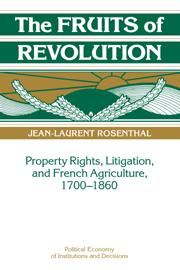Book contents
- Frontmatter
- Contents
- List of tables, figures, and maps
- Series editors' preface
- Preface
- 1 Introduction
- PART I HISTORY AND ECONOMICS
- PART II DRAINAGE AND IRRIGATION
- PART III PROPERTY RIGHTS AND LITIGATION UNDER ABSOLUTISM
- Appendix 1 Wages, land prices, and interest rates
- Appendix 2 Estimating rates of return
- Appendix 3 Theoretical proofs
- Bibliography
- Index
Appendix 1 - Wages, land prices, and interest rates
Published online by Cambridge University Press: 27 March 2010
- Frontmatter
- Contents
- List of tables, figures, and maps
- Series editors' preface
- Preface
- 1 Introduction
- PART I HISTORY AND ECONOMICS
- PART II DRAINAGE AND IRRIGATION
- PART III PROPERTY RIGHTS AND LITIGATION UNDER ABSOLUTISM
- Appendix 1 Wages, land prices, and interest rates
- Appendix 2 Estimating rates of return
- Appendix 3 Theoretical proofs
- Bibliography
- Index
Summary
The sources of the data used to construct price series in Provence and Normandy are similar. For land prices and interest rates, I relied on notarial archives, while for wages I relied on the accounts of public organizations. The French notaires have no proper equivalent in the Anglo- Saxon world. The étude de notaire was a form of recording office that was neither truly private nor truly public. It was private in that public officials could not request notarial records, and public in that offices were sold by the state. Private contracts had to be signed in front of, and deposited with, a notaire in order to ensure judicial enforcement in case of noncompliance. In the rural world, both in the eighteenth and nineteenth centuries, notaires copied down all sort of contracts that transferred property rights between individuals. The copies they kept were bound in chronological order irrespective of the nature of the act. As a result, loans, mortgages, land sales and rentals, wills, estate inventories, public auctions, and marriage contracts run one after the other in notarial minutes. Yet these records rarely offer much in the way of tables of contents except for nominative indexes. Thus, although notarial archives offer a wealth of information pertinent to economic history, the collection of data from such sources is painfully slow.
The sources of wages require less introduction. Most of the price data that are available for Europe come from similar sources. I relied on the account books of three types of institutions to collect wage estimates: religious organizations, hospitals, and cities. For the South, at least, municipal accounts are usually very detailed.
- Type
- Chapter
- Information
- The Fruits of RevolutionProperty Rights, Litigation and French Agriculture, 1700–1860, pp. 180 - 188Publisher: Cambridge University PressPrint publication year: 1992



